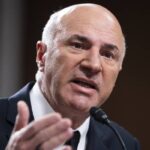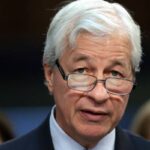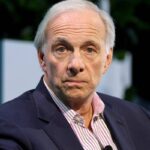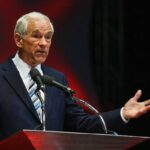We adhere to strict standards of editorial integrity to help you make decisions with confidence. Some or all links contained within this article are paid links.
Canadian Prime Minister Mark Carney has taken a hard line on President Donald Trump’s tariff threats, vowing to hit back with retaliatory trade measures designed to inflict “maximum impact” on the U.S.
While tensions between the two allies have escalated, “Shark Tank” investor Kevin O’Leary believes Carney’s tough talk is little more than political theatre ahead of Canada’s upcoming federal election.
Don’t miss
- I’m 49 years old and have nothing saved for retirement — what should I do? Don’t panic. Here are 5 of the easiest ways you can catch up (and fast)
- Gain potential quarterly income through this $1B private real estate fund — even if you’re not a millionaire. Here’s how to get started with as little as $10
- Car insurance premiums could spike 8% by the end of 2025 — thanks to tariffs on car imports and auto parts from Canada and Mexico. But here’s how 2 minutes can save you hundreds of dollars right now
“The anti-U.S. rhetoric is being stirred up by Carney because his party devastated the country over the last 10 years, and the only way he can stay in power is to convince people he’s the solution against Trump,” O’Leary said in a March 31 interview with Fox Business. “The rhetoric has never been hotter, and of course he’s five weeks away from an election, so he’ll stir the pot any way he can.”
Canada’s election is scheduled for April 28. O’Leary, who was born in Canada, didn’t hold back in his criticism of Carney and the prime minister’s Liberal Party.
“You’ve got to remember, Canada actually only grew under the Liberal Party 1.4% in 10 years. The economy is wiped out,” he said. “One of the reasons Canadians can’t go to Florida is, his party wiped out the value of the dollar … Canadians can’t afford to go to Disneyland anymore.”
O’Leary didn’t cite a source for his growth figure, but Trevor Tombe, professor of economics at the University of Calgary, has noted that Canada’s real GDP per capita grew just 1.4% from Q1 2015 to Q3 2024, based on data from the Organisation for Economic Co-operation and Development. The Liberal Party has been in power since late 2015.
As for the loonie (Canadian dollar), it has indeed weakened over the past decade. In April 2015, one Canadian dollar was worth about 81 U.S. cents. Ten years later, it trades closer to 70 cents — a drop of roughly 13.6%.
While O’Leary dismisses the tension as election-driven, trade disputes can trigger real geopolitical uncertainty with ripple effects that extend far beyond politics. Markets don’t react well to unpredictability, and we’ve already seen headlines of trillions in U.S. market value wiped out as Trump pushes forward with tariffs.
In times like these, financial experts often recommend taking steps to hedge against uncertainty. Here’s a look at three strategies that can help protect your wealth.
A classic safe haven
Gold has long been considered a go-to asset during times of economic and geopolitical uncertainty — and for good reason.
Unlike stocks or currencies, gold isn’t tied to any one government or economy. It also can’t be printed at will by central banks. Those characteristics make it especially attractive when confidence in political leadership, trade stability or the value of paper money start to slip.
When markets grow jittery, investors often turn to gold as a safe haven. Case in point: over the past year, gold prices have surged over 33%, recently topping $3,100 an ounce.
Billionaire hedge fund manager Ray Dalio has warned that most people “don’t have, typically, an adequate amount of gold in their portfolio.”
He added: “When bad times come, gold is a very effective diversifier.”
For those looking to capitalize on gold’s potential while also securing tax advantages, one option is opening a gold IRA with the help of Priority Gold.
Gold IRAs allow investors to hold physical gold or gold-related assets within a retirement account, thereby combining the tax advantages of an IRA with the protective benefits of investing in gold, making it an option for those seeking to shield their retirement funds against economic uncertainties.
When you make a qualifying purchase with Priority Gold, you can receive up to $5,000 in precious metals for free.
A time-tested income play
Real estate has long been a favored way to generate passive income — and unlike stocks or bonds, it’s a tangible asset you can see and manage.
While markets can swing wildly in response to headlines, high-quality, well-located properties can continue producing rental income regardless of what’s happening on Wall Street.
Real estate is also a time-tested hedge against inflation. As the cost of materials, labor and land rises, property values often increase as well. At the same time, rental income tends to climb, giving landlords a revenue stream that adjusts with inflation.
While home prices have been soaring and mortgage rates remain elevated, you don’t need to buy a property outright to get in the game. Crowdfunding platforms like Arrived have made it easier for average Americans to invest in rental properties without the need for a hefty down payment or the burden of property management.
With Arrived, you can invest in shares of rental homes with as little as $100, all without the hassle of mowing lawns, fixing leaky faucets or handling difficult tenants.
The process is simple: browse a curated selection of homes that have been vetted for their appreciation and income potential. Once you find a property you like, select the number of shares you’d like to purchase, and then sit back as you start receiving rental income deposits from your investment.
If you’re interested in commercial real estate, there are plenty of opportunities as well.
First National Realty Partners (FNRP), for instance, allows accredited investors to diversify their portfolio through grocery-anchored commercial properties without taking on the responsibilities of being a landlord.
With a minimum investment of $50,000, investors can own a share of properties leased by national brands like Whole Foods, Kroger and Walmart, which provide essential goods to their communities. Thanks to Triple Net (NNN) leases, accredited investors are able to invest in these properties without worrying about tenant costs cutting into their potential returns.
Simply answer a few questions — including how much you would like to invest — to start browsing their full list of available properties.
Read more: Thanks to Jeff Bezos, you can now become a landlord for as little as $100 — and no, you don’t have to deal with tenants or fix freezers. Here’s how
A finer alternative
It’s easy to see why great works of art tend to appreciate over time. Supply is limited and many famous pieces have already been snatched up by museums and collectors. This also makes art an attractive option for investors looking to diversify.
In 2022, a collection of art owned by the late Microsoft co-founder Paul Allen sold for $1.5 billion at Christie’s New York, making it the most valuable collection in auction history.
Investing in art was once a privilege reserved for the ultra-wealthy.
Now, that’s changed with Masterworks — a platform for investing in shares of blue-chip artwork by renowned artists, including Pablo Picasso, Jean-Michel Basquiat and Banksy. It’s easy to use, and with 23 successful exits to date, every one of them has been profitable thus far.
Simply browse their impressive portfolio of paintings and choose how many shares you’d like to buy. Masterworks will handle all the details, making high-end art investments both accessible and effortless.
Masterworks has distributed roughly $61 million back to investors. New offerings have sold out in minutes, but you can skip their waitlist here.
What to read next
- Want an extra $1,300,000 when you retire? Dave Ramsey says this 7-step plan ‘works every single time’ to kill debt, get rich in America — and that ‘anyone’ can do it
- Here are 5 ‘must have’ items that Americans (almost) always overpay for — and very quickly regret. How many are hurting you?
- Do you rely on your monthly Social Security check to get by? Here are 5 simple money moves for American seniors during Trump’s presidency
This article provides information only and should not be construed as advice. It is provided without warranty of any kind.








